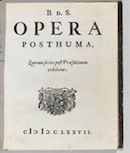
Selection from –Political Treatise - Chapter IV, of the functions of supreme authorities. (Page 3)
Spinoza's Words – (conclusion to Chapter IV – civil law cannot be broken without loss of the commonwealth)
 We see, then, in what sense we may say, that a commonwealth is bound by laws and can do wrong. But if by "law" we understand civil law, and by "wrong" that which, by civil law, is forbidden to be done we cannot at all say, that a commonwealth is bound by laws, or can do wrong.
We see, then, in what sense we may say, that a commonwealth is bound by laws and can do wrong. But if by "law" we understand civil law, and by "wrong" that which, by civil law, is forbidden to be done we cannot at all say, that a commonwealth is bound by laws, or can do wrong.
For the maxims and motives of fear and reverence, which a commonwealth is bound to observe in its own interest, pertain not to civil jurisprudence, but to the law of nature, since they cannot be vindicated by the civil law, but by the law of war.
Civil jurisprudence depends on the mere decree of the commonwealth, which is not bound to please any but itself, nor to hold anything to be good or bad, but what it judges to be such for itself. And, accordingly, it has not merely the right to avenge itself, or to lay down and interpret laws, but also to abolish the same, and to pardon any guilty person out of the fullness of its power.
Contracts or laws, whereby the multitude transfers its right to one council or man, should without doubt be broken, when it is expedient for the general welfare to do so. But to decide this point, whether, that is, it be expedient for the general welfare to break them or not, is within the right of no private person, but of him only who holds dominion therefore of these laws he who holds dominion remains sole interpreter.